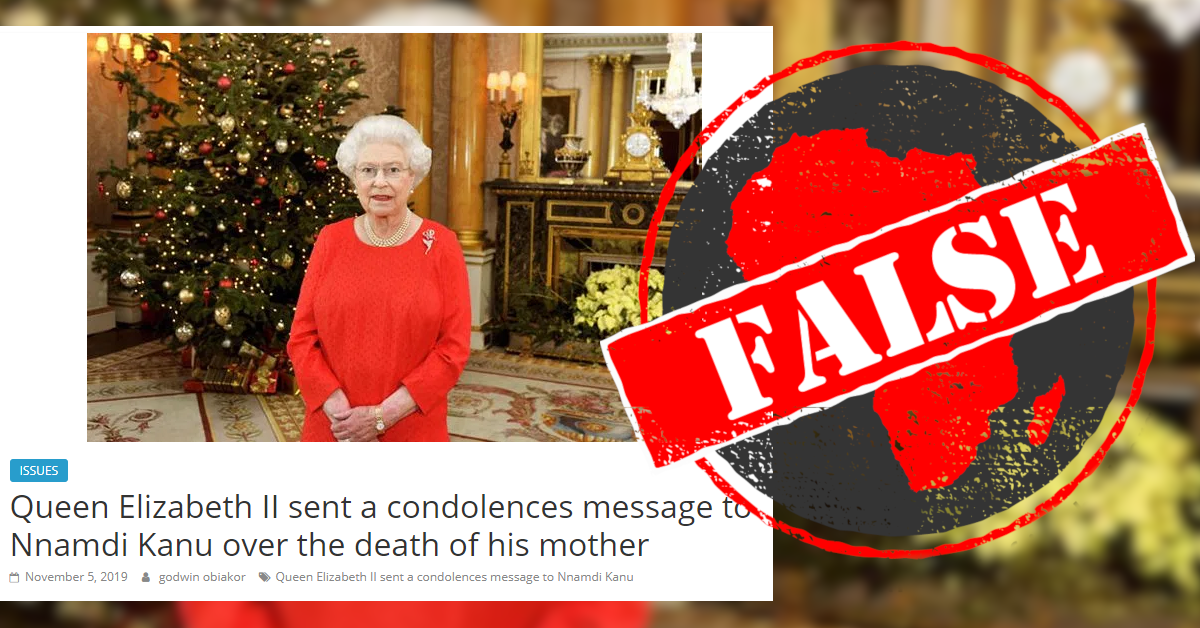Britain’s Queen Elizabeth II has sent condolences to Nnamdi Kanu, leader of the Indigenous People of Biafra (Ipob), for the death of his mother, claims an article on the Pointer News blog dated 5 November 2019.
Kanu’s mother Sally Kanu died in Germany on 30 August, according to news reports. Ipob promotes the independence of Biafra, a region in south-eastern Nigeria. Its secession in 1967 sparked a civil war, and sympathisers’ calls for its independence continue.
The Pointer News claims the queen “made this statement, during an interview with an African correspondent TV, in the United Kingdom”.
It quotes her as saying: “I am deeply saddened by the loss you and your family have suffered. My heart goes out to you in this trying times and may you and your loved ones find the strength to go through this.”

Africa Check reached out to the Pointer News for evidence that the queen made the statement. They are yet to respond.
An advanced Twitter search finds no mention of Nnamdi Kanu or Sally Kanu on the British royal family’s official account.
There’s also no mention of them on the royal family’s official website.
We have also been unable to find any report by a credible news organisation that Queen Elizabeth II sent condolences to Nnamdi Kanu.
In the past year Africa Check has debunked a number of false Biafra-related claims published on the Pointer News. – Jennifer Ojugbeli
Kanu’s mother Sally Kanu died in Germany on 30 August, according to news reports. Ipob promotes the independence of Biafra, a region in south-eastern Nigeria. Its secession in 1967 sparked a civil war, and sympathisers’ calls for its independence continue.
The Pointer News claims the queen “made this statement, during an interview with an African correspondent TV, in the United Kingdom”.
It quotes her as saying: “I am deeply saddened by the loss you and your family have suffered. My heart goes out to you in this trying times and may you and your loved ones find the strength to go through this.”

No proof of the Queen’s press release
Africa Check reached out to the Pointer News for evidence that the queen made the statement. They are yet to respond.
An advanced Twitter search finds no mention of Nnamdi Kanu or Sally Kanu on the British royal family’s official account.
There’s also no mention of them on the royal family’s official website.
We have also been unable to find any report by a credible news organisation that Queen Elizabeth II sent condolences to Nnamdi Kanu.
In the past year Africa Check has debunked a number of false Biafra-related claims published on the Pointer News. – Jennifer Ojugbeli
Republish our content for free
For publishers: what to do if your post is rated false
A fact-checker has rated your Facebook or Instagram post as “false”, “altered”, “partly false” or “missing context”. This could have serious consequences. What do you do?
Click on our guide for the steps you should follow.
Publishers guideAfrica Check teams up with Facebook
Africa Check is a partner in Meta's third-party fact-checking programme to help stop the spread of false information on social media.
The content we rate as “false” will be downgraded on Facebook and Instagram. This means fewer people will see it.
You can also help identify false information on Facebook. This guide explains how.





Add new comment